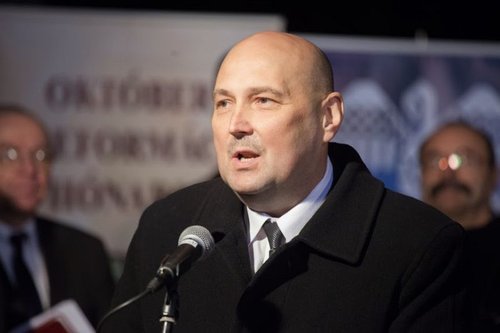Diversity as a Task
2014. január 23., csütörtökRegarding the Week of Prayer for Christian Unity, reformatus.hu interviewed the Reformed Bishop József Steinbach, President of the Ecumenical Council of Churches in Hungary.
“Has Christ been divided?” – reads the question in the key biblical text for the week of prayer. What was Paul’s message to the Corinthians with this question?
The messages of the highlighted bible passage (1 Corinthians 1: 1-17) were divided into eight days by the Canadian Christians in accordance with the inner logic of the text. They highlighted those thoughts which answer your question and clearly bind us to Christ and to one another. The first theme is sanctity: we are saints because we are the Lord’s own people, elected and called by Him. Second issue is the gratitude for the grace communicated in Christ which offers us reconciliation with God, with each other and with ourselves; especially because we have eternal life, a gift making our earthly life blessed, joyful. God has renewed our personality, but not eliminated our personality, which means we are different and God uses this diversity for the sake of our common cause in Christ. God is faithful to His people and to the community of salvation. Nobody can separate us from His love. Thus, our community together is an evidence, because it is an inherent and necessary consequence of God’s community with us. There is no objection to this! Our community is reality and a task at the same time: we have to proclaim the Gospel univocally and adjust ourselves to each other because we are convinced that the object of our faith, Christ, is the same. Christ is the head and we are His members, each of us in our own place, but serving faithfully one and the same living and risen Lord. There can be disputes and differences between us, but no quarrel is justifiable that depends on men instead of Christ – whether they are called Paul, Apollos, or Cephas. And after all, dispute must not be fueled by hatred. Our common call is to proclaim the Gospel.

Christianity, while fulfilling its calling, is divided into a multitude of denominations. What does Paul’s quoted question mean in this separation? How far can denominationalism be seen as division?
I am convinced that beyond the "expected" and "fashionable" ecumenical expressions of our time, our own specific way of being Christian and safeguarding our own heritage, is a huge blessing. At the same time it is an inevitable imperative to come to an ever clearer, deeper and more Christ-like understanding of God’s word, and hence a common, humble but firm representation of Christ’s gospel and the system of its eternal and universal values in a changing, obscure and “diluted” world – in Hungary, in Canada, or around the world. In this we shouldn’t be led by the wish of submerging the other, but inspired by the firm conviction that Jesus Christ is the way, the truth and the life. He is the only source of salvation as well as a joyful individual and community life.
Christians from Canada prepared the resources for the Week of Prayer this year. What can Hungarian churches, dedicated to ecumenism learn from them?
The presentation of the Canadian communities in the booklet of the Week of prayer answers this question. Canadian people are living in a country that is characterized by linguistic, cultural and climatic diversity, which is reflected also in the different expressions of faith. Canada is a vast country, a land of diverse people, where aboriginal people (First Nations) peacefully live together with settlers from all around the world, where beside two official languages, English and French, also other tongues, cultural and religious heritages flourish. This diversity, the co-existence of so many different identities even for them is a challenging task. But in this context there is no other choice than understanding and accepting each other, respecting others’ values, cooperating for the common goal and mutual support of each other. This kind of attitude and behavior defines also the relationship between the different denominations, and this is something to learn. It does not mean giving up, weakening and obscuring the truth of the Gospel, but instead it helps in living and proclaiming it.
Zsuzsa Bagdán, Photo: Krisztián Sereg
Originally published by: Reformátusok Lapja 2014/3
Front photo via sofarportal.hu
Contact us
Click here if you are interested in twinning.
Reformed Church in Hungary
Address: H-1146 Budapest, Abonyi utca 21.
PO Box: 1140 Budapest 70, Pf. 5
Email: oikumene@reformatus.hu
English, German and Korean language services in Budapest
Links
Recommended articles
-
Pastoral Letter in the Light of the Pandemic
Bishop Dr. István Szabó sent a pastoral letter of encouragement to the ministers serving in RCH’s congregations, expressing his gratitude for the persistence and creativity of the pastors.
-
RCH Joins in Pope's Call for Prayer
RCH published the call on congregations to join the initiative of Pope Francis, supported by ecumenical organisations, to unite in praying the Lord’s Prayer on Wednesday, 25 March, at noon.
-
English Speaking Worship Services Online
Each Sunday at 11 AM (CET) the St. Columba's Church of Scotland in Budapest, the international community of RCH invites you to join the worpship service on its facebook page.
-
Test of Humanity and Companionship
Reformatus.hu asked Dr. György Velkey, Director General of the Bethesda Children’s Hospital of RCH about the challenges of health care workers and ways of prevention against the pandemic.
-
All Church Events Suspended
In light of the coronavirus the Presidium of RCH requested congregations to suspend all church events with immediate effect. Beside restrictions, it calls for prayer, sobriety and responsibility.











